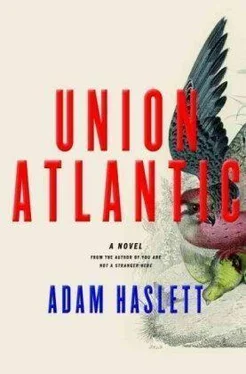A trowel in her gloved hand, the skin of her face a fine, tan wrinkle, those heavy stones and the little silver rings that separated them hanging around her neck.
Why hadn’t she given him away, he wondered now. When his mother approached, Mrs. Gammond had said nothing, made no congratulatory comment or aside, as if she’d known the news was a secret. She’d just smiled and waved goodbye.
She had been elderly back then; by now she would be dead and gone.
Putting the matter aside, he kept walking up the street, looking for a gap in the fence. Stepping into the field, he strode through the tall grass, making for the house.
Out of the corner of his eye, he saw a figure moving quickly toward him in the twilight.
“Hold it there,” the man called out, “you can’t come in this side.” He hustled up to block Doug’s path, all suited six-three of him, complete with an earpiece and a flag pin on his lapel.
“Get out of my way,” Doug said.
“This is a private party, sir, if you—”
“I pay your fucking wage!” he shouted, pushing past the goon.
___________
HE FOUND HOLLAND coming down the steps of the terrace, a crystal tumbler in hand.
“We’ve got a problem,” Doug said. “We need to talk.”
“Well, gosh, thanks for the news flash. I’ve been dealing with it all morning. Bernie fucking Ebbers. How much money did we lend that guy? And now that showboat Spitzer is after us. Like we’re the first people in the world to do our clients a favor? He’s a politician for Christ’s sake, he does favors for a living. But oh no, the party in the market is over, right? And the people want their sacrificial lambs. The script’s as old as Teddy Roosevelt, and if we’re lucky it’ll be just as toothless. But they’ll want cash and that’s the one thing we don’t have right now, thanks to you.” He emptied his glass. “So yeah, you’re right, we’ve got a problem.”
“Let’s go inside.”
His shoulders slumping, Holland turned back up the steps and led Doug down the hall and into his study. Closing the door behind them, Doug leaned his back up against it.
“We’re in trouble,” he said. “More than we thought.”
As Doug explained what McTeague had done, Holland’s head moved up and back, as if tapped on the nose by a boxer. When it sunk forward again, his mouth was half open and he looked dazed.
“No,” he said, shaking his head. “No.”
At which point, the door handle nudged Doug in the small of his back and he stepped aside to watch Glenda enter. She wore a red silk dress with blue pearl buttons and across her chest a spray of diamonds.
The Adderall she’d taken following her nap had mixed with the drink to give her the novel sensation of being simultaneously drunk and highly efficient.
“Hello, Doug,” she said, unsteady on her feet. “How are you? I was so sorry to hear about Judge Cushman’s decision. But I’m sure you and Charlotte will work it out, won’t you? Now Jeffrey, you need to come with me. Did you notice we have three hundred guests in the yard? Come along, come with me.”
She motioned with her index finger as a parent might to a child.
“Where the fuck is Lauren?” Holland asked no one in particular, and certainly not his wife.
“She’s doing her job, dear. Now it’s time for you to do yours. Come along.”
“Jesus, Glenda,” he said. “Hold it together, would you? I’ll be there in ten minutes. Just get out there and deal with it. And for Christ’s sake stop drinking.”
Glenda turned to Doug and smiled. “So good to see you,” she said. “You really are so handsome. And my husband keeps you all to himself.” She rested her limp, sweating hand on his wrist. “Be a darling. Bring him out to the party, won’t you?”
Like a luxury car with poor turning radius, it took some effort for her to steer back through the door, which Doug closed behind her.
Across the room, Holland stood with his back to the bay window, his face drained, all his bluster gone. He could put on exasperation about WorldCom and Spitzer and all the other difficulties; he could even enjoy them, the way they lent him the air of the embattled leader, comfortable all the while in the knowledge that in the end the bank would take a few write-offs and move on. Companies with bloated stock prices could now and then go belly-up, but everyone knew the biggest banks just kept marching.
“We give McTeague to the authorities,” he said, reaching for conviction. “That’s what you do. We fire him, close out his positions, and put out a statement.”
“Are you out of your mind? We’d lose half our capital base overnight. Our customers would run for the doors. Not to mention trigger a crisis. You’re not thinking straight. We’re talking about survival. And not just for this company. You’ve got a responsibility to that.”
“Who the fuck are you to talk about responsibility?”
“Come on, Jeffrey. Is this how you’re going to play it? Throw your hands up, get some cheap ethical high, and spend the next three years in depositions?”
“Is that a threat?”
“Don’t be ridiculous. The point is, you’re letting the situation get to you. That’s not how it has to be.”
“Oh really? And what do you propose?”
Doug had never seen him so frightened. Most all of what Holland had achieved in life had flowed from the bottomless well of his self-confidence, a great, social largesse that made everyone in his orbit feel as if they’d been selected for the bright and winning team. Contemplating a failure of this magnitude undid the premise of him.
“We keep feeding him money for now,” Doug said. “We keep the positions off our books, on his phony clients. And we wait. Sell what and when we can and wait for the rest to turn around. We keep our nerve. That’s what we do.”
“That’s your plan? Double the entire bank down on a single bet and hope for the best? I expected more out of your scheming mind.”
“You have another idea?”
“Fraud. That’s your answer? You’re suggesting we commit fraud? You want me to stand up at the shareholders’ meeting and with all the other great news add that things are going fine and dandy in foreign operations?”
“It’s your call,” Doug said, wandering over to the bookcase. “We can sell. I can call Hong Kong right now. If you’re lucky, you’ll get to retire with some fraction of what you’ve got and be remembered as the guy who built a powerhouse and ran it into a ditch. And once they start digging and reporting and trying to understand what really happened — and they will — the shareholders will sue you anyway, and maybe the Feds will too. That’s one option: be the upstanding guy. But that’s not the advice you hired me to give you. I’m here because you wanted to win.”
Doug took down from the shelf a vintage leather-bound edition of de Gaulle’s memoirs only to find that the pages remained uncut.
“You know what I’ve been thinking lately?” he said.
“I shudder to think,” Holland said.
“About how things are changing. The old compact. Between government, companies, the news. The basic assumptions about how everyone behaves. Most people have some vague sense of it. They feel a kind of undertow and they’re scared by it. But they don’t see how fundamental the shift is. They don’t see it because they’re too busy surviving or lamenting whichever piece of the old assurances they happen to be losing. So they get sentimental, wishing the tide wouldn’t come in. At least that’s what the losers do. You can do that. Or you can admit what we’ve always been up to. And then you can focus on the bigger picture.”
“And what might that be?”
“Influence. Power over information. Control. Something bigger than rules or good taste. The more permanent instincts. You know what I’m talking about. You even get off on it. It’s just the appearance of it that bothers you.”
Читать дальше












